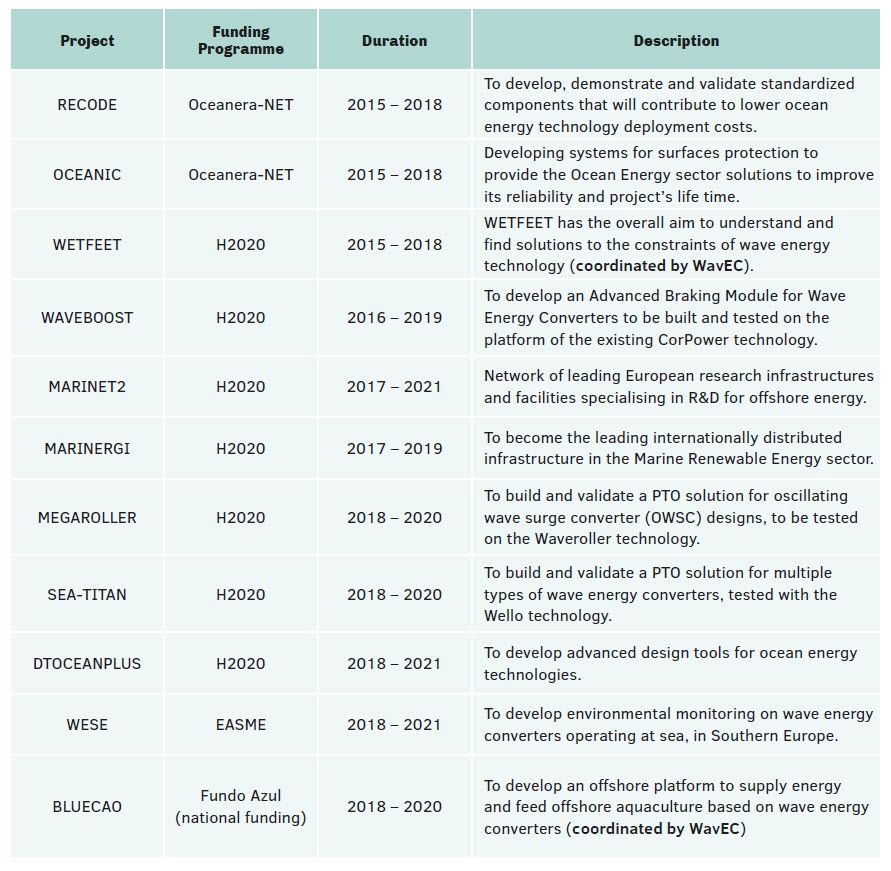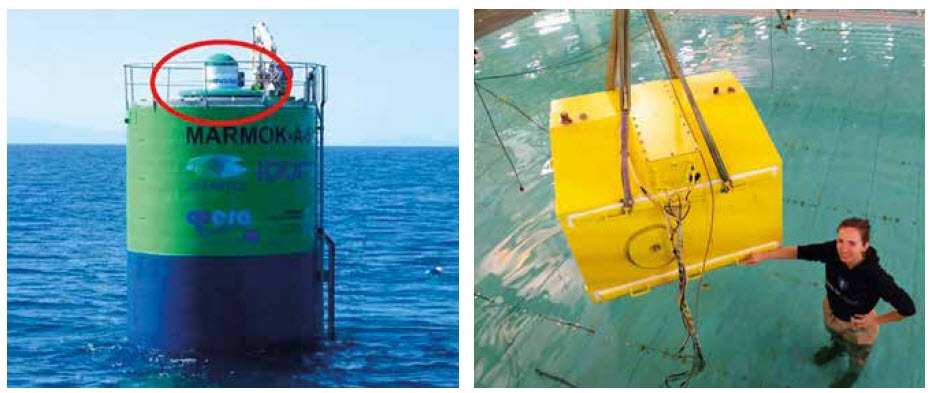Country Reports
Following previous years, the activity at IDMEC concentrated on wave energy conversion, especially the development of new types of oscillating water column converters (OWCs) and self-rectifying air turbines. An important area of research at IDMEC is latching control of floating and fixed-structure OWC converters, taking advantage of new types of air turbines fitted with fast valves.
PORTUGAL
Ana Brito e Melo & Antonio Falcão
WavEC Offshore Renewables) & Instituto Superior Técnico (IST)
RESEARCH & DEVELOPMENT
WavEC Offshore Renewables
WavEC is a private non-profit organization with a strong research and innovation component and a broad spectrum of specialized services in Marine Renewable Energies and Engineering Solutions for the ocean economy, incorporating technological, economic, environmental, social and legislative aspects. Following is a list of selected R&D projects on ocean energy, running in 2018, in which WavEC has been involved:
 |
In 2018, WETFEET, an European funded project of the H2020 programme led by WavEC, was concluded. This three-year project with a total funding of €3.5millions comprised teams from Austria, France, Italy, Portugal, the Netherlands and the United Kingdom. Using as a starting point the identification of the major constraints that have been delaying wave energy’s progress, WETFEET analysed key pressing issues (technical, economic, financial and environmental) that need to be addressed in order to improve the whole sector. More information at: http://www.wetfeet.eu/
In late 2018, three new European funded projects were approved, ETIP Ocean2, an European Technology and Innovation Platform for Ocean Energy, funded by H2020 and BLUEGIFT funded by Interreg Atlantic Area Programme. This last one, managed by EMEC, will give the opportunity to promote open sea testing in Portugal.
INSTITUTO SUPERIOR TÉCNICO
Two groups were active on ocean energy at Instituto Superior Técnico (IST):
- Institute of Mechanical Engineering (IDMEC) with decades-long history in wave energy conversion studies;
- Centre for Marine Technology and Engineering (CENTEC), whose involvement in ocean energy is more recent.
Following previous years, the activity at IDMEC concentrated on wave energy conversion, especially the development of new types of oscillating water column converters (OWCs) and self-rectifying air turbines. An important area of research at IDMEC is latching control of floating and fixed-structure OWC converters, taking advantage of new types of air turbines fitted with fast valves.
IDMEC/IST was a partner in the WETFEET project coordinated by WaVEC (European H2020 programme) that terminated in May 2018; in 2018 the involvement of IDMEC/IST concerned mainly the development of a multipurpose platform made of OWCs wave energy converters that has been tested at 1:40 scale at Plymouth University. IDMEC/IST is also a partner in the OPERA project (H2020), in which, jointly with the Portuguese company Kymaner, designed a prototype of the biradial self-rectifying air turbine with a new type of fixed guide vanes and a fast valve. The turbine prototype was supplied by Kymaner, and was installed at one of the OWCs of the Mutriku breakwater (Basque Country, Northern Spain), where it was operated under real sea conditions until July 2018. In October 2018, the turbine-generator set was installed on the MARMOK-A-5 spar-buoy OWC of the Spanish company Oceantec/IDOM, and is operating at the BiMEP test site (Bay of Biscay, Northern Spain).
Another wave energy converter concept has been under development at IST: the UGEN, a floating device with an interior U-shaped oscillating water column and a self-rectifying air turbine. A 1:24 scale model was tested in 2018 at the wave tank of Plymouth University, UK, within the framework of the European programme MARINET 2.
 Biradial turbine installed on MARMOK-A-5 spar-buoy OWC, at Bimep, Basque Country, October 2018 (left). Model of UGEN at the wave tank of Plymouth University, UK (right). Biradial turbine installed on MARMOK-A-5 spar-buoy OWC, at Bimep, Basque Country, October 2018 (left). Model of UGEN at the wave tank of Plymouth University, UK (right). |
Ocean energy is a major area in the diversified activity of CENTEC/IST. The activities at CENTEC in ocean energy involved a wide range of topics covering waves, tidal currents and offshore wind. The characterization of the wave energy resource (and to a much lesser extent tidal and offshore wind energies) at various oceanic locations in the world has been one of the dominant topics. The study of ocean energy conversion focused mainly on wave energy converters, with numerical theoretical/modelling and model testing of several types of devices and arrays, and also PTOs (namely hydraulic-circuit PTOs).
University of Algarve
At University of Algarve there is one active group on tidal current energy, the Marine Offshore Renewable Energy (MORE) team, which has been involved in the following three projects:
- OpTiCA – Optimisation of Tidal Energy Converter Arrays: a 2-years project funded by H2020 that aims to provide a significant contribution towards the understanding of (a) the effects of Tidal Energy Converters (TECs) interactions with the environment; (b) the capabilities and limitations of common strategies used for the numerical modelling of TECs; and (c) how to mathematically formulate optimisation models to solve the TEC array layout problem considering technical, socio-economic and environmental constraints. This project is led by the Marine Offshore Renewable Energy (MORE) team from the University of Algarve (https://www.msca-optica.eu).
- SCORE - Sustainability of using Ria Formosa Currents On Renewable Energy production: this project funded by the national Foundation for Science and Technology (FCT) started in 2016 and will run for 3 years. The general objective of SCORE is to examine a small scale tidal current turbine Evopod E1 (1:10th scale), from UK-based tidal energy developer Oceanflow Energy, to be deployed in a shallow-water estuarine environment at Ria Formosa, a coastal lagoon in the south of Portugal, looking at both the impacts of the turbine on its environment and the effects of the flow conditions on the turbine (http://w3.ualg.pt/~ampacheco/Score/aboutscore.html)
- MONITOR - Multi-model Investigation of Tidal Energy Converter Reliability: a 3-years project funded by the European funding programme INTERREG Atlantic Area, that started in 2017, led by Swansea University, whose objectives are to investigate the reliability of tidal energy converters and develop tools to increase it. The roles of the University of Algarve are: 1) to plan and coordinate field work activities from two full scale tidal turbine deployments: Sabella D10 at Passage du Fromveur (France) and Magallanes Renovables’ ATIR platform at EMEC (UK); 2) to collect and process the resulting data; and 3) to publish the findings in a suitable format (https://www.monitoratlantic.eu/).
INEGI - Institute of Science and Innovation in Mechanical and Industrial Engineering
INEGI is an Institution at the interface between the University of Porto and the Industry, oriented towards the activities of Research and Development, Innovation and Technology Transfer. INEGI has been involved in nationally and internationally funded and subcontracted projects related to Marine Renewable Energy (mainly offshore wind and wave energy).
Since 2017 INEGI is coordinating the SE@PORTS project, funded by the national Foundation for Science and Technology (FCT) through the funding programme Oceanera-net. In addition, INEGI has been involved in a number of R&D projects related to sea activities mainly funded by the European Commission. Two new projects related to the ocean energy were approved during the year 2018:
- I.nano.WEC: a 2-year project, which started in May 2018, funded by the national fund “Fundo Azul”, aiming to develop the first marine buoy prototype integrating highly efficient energy harvesting systems based on triboelectric nanogenerators. The coordinator of this project is the InanoEnergy (www.inanoe.com) which is a start-up company created in 2016 to develop, prototype and produce energy harvesting solutions with applications on the internet of things.
- PORTOS: a 3-year project, with start date scheduled to April 2019, funded by the European funding programme INTERREG Atlantic Area, aiming to develop and promote the implementation of renewable energy (RE), especially marine energies at ports in the Atlantic Area, targeting two environmental priorities for ports: reduction of greenhouse gases emissions and air pollution, by providing RE-based solutions to harvest the Renewable Energy potential of the Atlantic coastal areas. Moreover, PORTOS aims to increase the energy efficiency of the ports, establishing a roadmap to a more competitive and sustainable sector, mitigating climate change. PORTOS project will be lead by the University of Porto.



